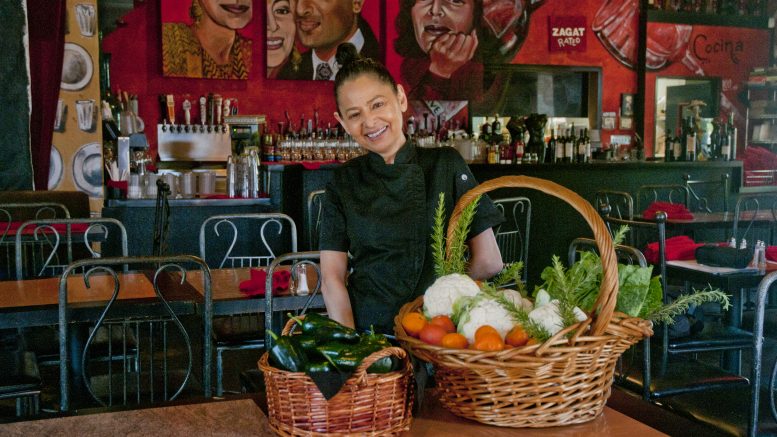Elk Grove restaurant owner is committed to sustainable business practices
Marie Mertz, owner of beloved Elk Grove eatery Todo Un Poco, applies a karmic philosophy to the sustainable business practices she’s woven into the operation of the Mexican-Italian bistro: “Everything is a circle,” she says. “If you do something good, good things happen. When you do something bad, bad things can happen.”
Mertz says her business has been devoted to environmental consciousness since it opened 26 years ago, and for the last 10 years she’s specifically focused on reducing the restaurant’s organic waste to zero. Meeting that goal is an end-to-end effort, from taking care in selecting ingredients and crafting recipes to personally hand-feeding leftover rice and vegetables to lucky chickens on a local farm.
It starts with buying local, organically grown ingredients whenever possible, which Mertz notes not only makes for delicious meals, but cuts down on fuel usage and packaging waste. She is careful to buy only what she expects is needed to ensure edible food doesn’t go unused and plans the menu around what is seasonally available.
“We do everything dish by dish,” she says.
“Start with little goals to reduce waste every day. If we all do at least some little things, then together we can make big changes.”
Marie Mertz, Owner of Todo Un Poco
When the restaurant has an abundance of one ingredient, she creates menu items in order to use as much surplus as possible. As a recent example, the restaurant had a bounty of bananas, so Mertz used social media to promote some special drinks and dishes—banana daiquiris, banana calzones, and Cuban-inspired pork and rice dishes (ropa vieja and congri, respectively) served with a fried banana on the side.
Mertz says people in Elk Grove can do similar things at home when they have surplus ingredients: “Get creative! Play in the kitchen! Find a recipe that will use that, maybe freeze some of it, or share it with your neighbor … even a small act of kindness like that can reduce waste.”
What little food waste is left over from the kitchen is delivered weekly to a local farm called Cliff’s Garden, owned by Cliff Wilcox. Most of this is fed to the chickens and some items are used as soil amendments. The restaurant and the farm have had this arrangement for more than 10 years (“Cliff is our partner in sustainability, and we love him,” Mertz says).
Diners’ uneaten food is not taken to the farm but placed directly into the organic waste bin. That food waste is in turn separated from other organic material at the Elder Creek Transfer Station, and eventually turned into fuel and other products.
The city of Elk Grove, and all of California, has been working to implement SB 1383, which aims to reduce organic waste and the greenhouse gasses it produces. Grocery stores and large restaurants (those above 5,000 square-feet or with a capacity of 250 or more diners) must also donate food to food recovery organizations. Even though Todo Un Poco is smaller, they still go above and beyond to do their part in the fight against food waste.
“We don’t do it because it’s the law or because its fashionable, we do it because it’s the right thing to do,” Mertz says of the restaurant’s efforts.
Mertz says she’s happy to share her experience and sustainable business practices, strives to educate her employees and customers about waste reduction, and encourages others to make an effort: “People don’t need to go to a farm or do anything too drastic,” she says. “Start with little goals to reduce waste every day. If we all do at least some little things, then together we can make big changes.”
For more information about organic recycling in the city of Elk Grove, go to www.elkgrovecity.org/recycling-and-waste/organic-recycling.






























